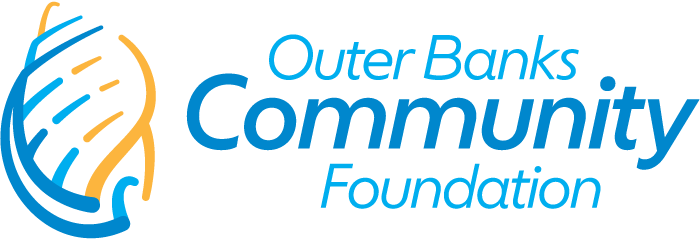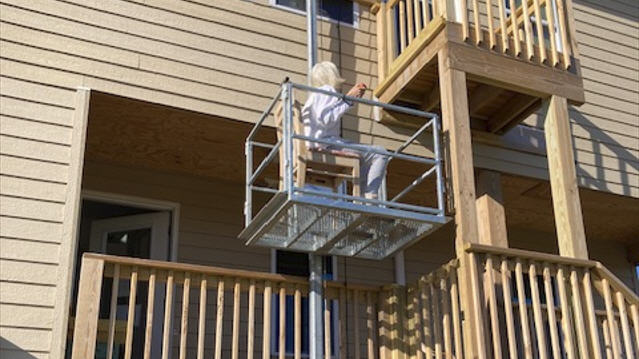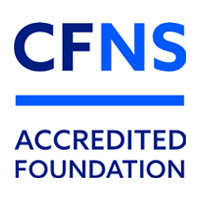CHUMM Is Giving Hatteras Islanders A Lift
Reprinted with permission from Island Free Press
By Joy Christ
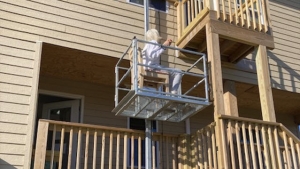
An installed lift on Hatteras Island. Photo courtesy of CHUMM.
Take a look around the Outer Banks landscape, and you’ll notice a recurring theme when it comes to the homes that make up the region’s barely-above-sea-level communities – stairs.
With a few notable exceptions in the high-and-dry areas of maritime forest, most of the residences on Hatteras Island are perched on pilings. It’s an unusual phenomenon for newcomers, but not for the thousands of residents who live on the Outer Banks, and who understand that having a little elevation means a lot of protection when it comes to storm-induced oceanside or soundside flooding.
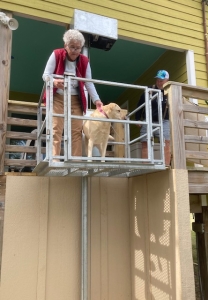
A Hatteras Island resident and her pet get a ride on her new lift. Photo courtesy of CHUMM.
Having multiple flights of stairs attached to a house is normal on Hatteras Island, but when mobility and the ability to climb stairs becomes a problem for residents, it spiderwebs into a wave of challenges that begin at home.
At some point, due to injury, progressing medical issues, or simple and unavoidable age, a number of island residents reach a point where the stairs that keep them out of harm’s way when flooding occurs become an obstacle.
Tall homes on small lots often make the addition of handicap-accessible ramps an expensive challenge, (as the ramps have to zig-zag back and forth over several stories of living space), and for most folks who have lived here for 20, 30, or 40 years or more, moving to an off-island location where one-story homes are plentiful is an unenticing last resort.
This is why one of the Cape Hatteras United Methodist Men’s more recent initiatives, (which was made possible by a grant from the Outer Banks Community Foundation), has been so life-changing for a few local residents – the installation of electric lifts.
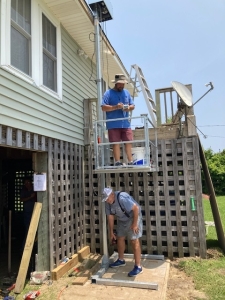
CHUMM volunteers doing a lift installation. Photo courtesy of CHUMM.
The Cape Hatteras United Methodist Men (CHUMM) is known throughout the Outer Banks as a resource in every vein imaginable. In 2023 alone, CHUMM served over 125 families (or more than 300 people) monthly from their food pantry, paid the rent and/or utilities for families with temporary financial crises, conducted emergency home repairs, and essentially helped Hatteras Island residents in need with targeted solutions for specific problems.
This direct and neighbor-to-neighbor care has been a staple of the organization since it was formed 46 years ago, and CHUMM works with Dare County Social Services, nonprofit organizations, and good old community conversations to identify situations where help is needed the most.
It was through these conversations – both formal and informal – that CHUMM started to realize there was a growing need for electric lifts, and particularly for longtime island residents who were having issues close to home.
“We had been getting calls and requests from [Dare County] Social Services and others to build wheelchair ramps,” said CHUMM Director Dennis Carroll. “We built several for lower homes, but for [elevated] homes, it just seemed impractical. Ramps take up a lot of space, and a lot of material and labor.

CHUMM volunteer working on a lift installation. Photo courtesy of CHUMM.
“So, we started looking into electric lifts,” said Carroll. “These are exterior additions, and are just to get people to their decks or porches.”
From this initial idea, CHUMM members started to research the options.
They found the most affordable lifts from a supplier based in Lynchburg, Virginia, and ensured that the lifts were fairly easy to install, and could stand up to the coastal conditions. CHUMM volunteers then studied how to install these lifts, until the proposed solution became a reality.
“We have some guys who have become experts at it, so much so that the company requested that we become a dealer,” said Carroll.
The first lift was installed in early 2021 for a local resident who, because of deteriorating mobility issues, could no longer manage the up-and-down trek to access her home.
“It was life-changing for her,” said Carroll. “She loved to garden but couldn’t maneuver the steps, and she couldn’t walk her dog, so it changed everything.”
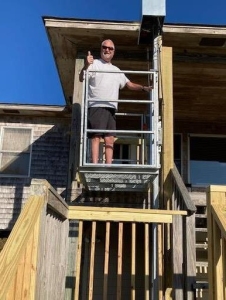
Captain David Wilson, who had to give up his fishing business because of a degenerative muscle disorder, can now easily get out of his home with his new lift. Photo courtesy of CHUMM.
Since the initial 2021 installation, a total of 10 lifts have been installed, with eight that are in active use.
Realizing that the life-changing lifts program was a slow but steady success, CHUMM submitted a grant request to the Outer Banks Community Foundation to keep the program going strong, and received an initial $12,000 cost-sharing award as a result.
This supplemental donation fills a big gap when it comes to funds to install lifts for residents, but CHUMM members are also constantly ensuring that no extra expenses or costs are incurred.
“For the last lift, one of our volunteers went to Lynchburg and picked it up, and saved $1,200 in freight,” said Carroll, noting that when it comes to the installation work, it’s the CHUMM volunteers who also do the heavy lifting. “While they were picking up the lift, it took us a couple of days to prepare the site, so in the end, we were able to quickly get it installed and running.
“We save thousands of dollars on labor costs, and we repurpose lifts when they are no longer needed, and that keeps this program going.”
There’s something extra effective about an organization that focuses on neighbor-to-neighbor help while cutting costs at every possible opportunity, and CHUMM co-founder Jim Carolan helped create the template.
“[CHUMM] first started out in 1980s,” said Carolan. “It started as a general men’s prayer group that met every month… We took up a collection every meeting, just so we could help people. There were some older people in Hatteras who needed help with bills, so we started there, and it just grew.”
Like most initiatives on Hatteras Island, word spread quickly.
“We became known throughout the community, and attendance in the group got larger, and we started doing other things for different people. From Hatteras to Avon, we would help people with light bills, pharmacy bills, just odds and ends,” said Carolan. “We would hold barbecue dinners once a year and we would make a little bit of money on that, and we started receiving donations from local people, just because we got to be known for doing those sorts of things.”
Connor’s Supermarket and Burrus Red & White were regular contributors to the annual barbecue early on, and more individuals and businesses started to take notice of CHUMM, and dole out financial contributions. Conversely, as local residents searched for last-resort solutions for various financial and other problems, they would contact CHUMM for assistance, overriding their pride with a need to stay afloat.
“Every penny we got went to help people, and it was a great thing,” said Carolan. “We didn’t even use [donations] for postage – we paid for that ourselves.”
1993’s Hurricane Emily ushered in a new and more publicized era for CHUMM.
Days after the historic storm, the organization started receiving donations from around the country – including a $5,000 donation from a generous and still-unknown person in California. But CHUMM also received a new and corresponding wave of emergency needs from the local residents who were knee-deep in the hurricane’s aftermath.
“That was also around the same time the food panty got started, and [Ray and Claire Schaaf] do a fantastic job, to this day,” said Carolan, referring to the couple who have been operating the food pantry – even during storms – for 24 years and counting.
Carolan was a backbone of CHUMM from the beginning, and roughly 40 years later, he was also one of the local recipients of a life-saving lift – an initiative that didn’t start with a direct request by Carolan, but by good old-fashioned word of mouth.
“Dennis [Carroll] was talking to [CHUMM co-founder] Drew Pullen, and Drew mentioned how hard it was for me to get up and down the stairs,” said Carolan. “They put it up in a day. They knew what they were doing – they had put up a couple before – and it’s definitely a life changer.”
Stairs are a community-defining and constant theme on Hatteras Island for sure, but another theme is that islanders don’t like to ask for help.
Vicki Collins literally found Hatteras Island as her permanent home by following a rainbow.
In 1989, she was staying at the Sea Gull Motel in Hatteras Village when she spotted a rainbow that seemed to land in Frisco Village.
Vacationing with a friend who had been exploring the Outer Banks since the 1960s, the pair tried to find the Frisco rainbow’s endpoint, and popped into a local store where they described what they were looking for. “The shopkeeper [Audrey Lawson] laughed and said, ‘Oh honey, everyone is looking for that,’’” said Collins.
Collins then noticed a nearby plaque on the Frisco store that read “God has your divine plan.” Following the literal signs, Collins used these minor connections to find a local place to live for just six months, which eventually became a 24-year residency and counting.
Collins is a caregiver. She initially moved to Hatteras Island to care for a well-loved local resident in need, and since his passing, has delved into a Life Coaching career.
With a lifetime of helping others under her belt, it is somewhat understandable why Collins was reluctant to ask for assistance when she found herself in an impossible situation at her Hatteras Island home.
The house she lived in was not up to county code, and despite her existing mobility issues, she had to elevate her home to a total of three stories, which was an impossible elevation for her inherent physical challenges.
“It was not up to code, and so they had to build up, and I knew it would be a problem,” said Collins. “I’m 5’11”, but I’m 5’11” on one leg, 5’9” on the other, and when I’m bent over, I’m 5’4”…. And when your first floor is 11 feet off the ground, and you have about 28 stairs to climb to get into your house, it was so difficult. With groceries, I just couldn’t do it. It was awful all the time.”
It took Collins several months to muster up the courage to ask for help, but she did, and she eventually connected with CHUMM.
“Dennis [Carroll] came over and said ‘let’s see what we can do,’” said Collins. “And that was that, and he saved my life.”
“I reluctantly called them, and it was one of the best moves I ever made,” she said. “I hesitated for months because I hadn’t gotten to the point where I was asking anyone for anything. But [CHUMM] has been nothing short of wonderful. They are a godsend for anyone who needs help.”
These stories of reluctant requests for help and lifelong gratitude are commonplace, and especially when it comes to CHUMM’s new lifts program.
A local fisherman who preferred not to be named, but who received a lift in September 2023, said the addition was a real blessing, and allowed him to work again after an injury unexpectedly ended his decades-long fishing career. “A neighbor across the street was involved in the Methodist Men and had watched me struggle,” he said. “I’m bad about not wanting to ask for help, but I don’t know how the last year would have been if this hadn’t happened.
“Someone spoke up on my behalf. It was a real blessing, and it makes all the difference in the world.”
On an island full of stairs, CHUMM is routinely facilitating solutions, in the most economical way possible, to give residents with mobility issues a way to go home.
Thanks to the funds provided by the Outer Banks Community Foundation, and the wave of efforts by dedicated volunteers who provide free labor, grit, and determination, CHUMM’s lift program will hopefully continue to elevate the lives of local residents for years to come.
